
98 minute read
Why Scandinavian IBS chose Penang
Chief Minister Chow Kon Yeow congratulates Erik Thomaeus at the opening in 2019 of the factory in Bukit Minyak, Simpang Ampat, Penang.
Why Scandinavian IBS placed its production in Malaysia
Advertisement
Scandinavian IBS is a Swedenbased company involved in the manufacturing of Industrial Building System and one of SIBS Group’s five companies, is producing housing modules and peripherals in a factory located in Penang in Malaysia.
Swedish media Dagens Industri asked Erik Thomaeus, CEO of SIBS Group on why Malaysia was chosen. According to him, this was already the plan before he and his brother started the company in 2016.
“The whole idea of creating a construction system and manufacturing homes industrially was born in part from Malaysia highlighting that they wanted to be bigger in industrial construction processes and production,” Erik Thomaeus explained.
“Through my previous company, I have been active in the country since the early 2000s and I have always thought it was easy to do business there. We have a friendly attitude towards foreign companies and our presence is seen as a way for the economy to grow,” he says to Dagens Industri.
Such a simple thing as everyone speaking English is something that Erik Thomaeus sees as an enormous advantage. The Malaysians also have a high work ethic and see great pride in their work and over the years
“There are many talented suppliers to work with, both large internationally known companies but also a plethora of fine smaller family companies. Since we work with many different types of components, we have, for example, several local mechanical workshops as Erik Thomaeus explaining the benefits of prefab building construction.
subcontractors. Seventy percent of the material we use comes from Malaysia, 20 percent from the rest of ASEAN, while the rest is Swedish or German.”
“Then we export 100 percent of what we produce in Malaysia to Sweden. As it can be a bit cumbersome to import and then export again, we have received help from the Malaysian Agency for Investment Development (MIDA) to have a simplified customs clearance process.”

News brief Nordic Day in Vietnam celebrated with Nordic Green Capitals seminar

Nordic Day, 23 March 2021, saw the Nordic Embassies in Vietnam (Denmark, Finland, Norway and Sweden), organize together with the National Academy of Politics a seminar on Nordic Green Capitals – Political Leadership, Sustainability and Innovation in a hybrid format.
The main purpose of the seminar was to promote exchange of knowledge and experience between the Nordic countries and Vietnam on how to ensure that their capital cities grow in a green, innovative and sustainable manner. The seminar had broad participation of high-ranking representatives and policy-makers from the Vietnamese government agencies, local experts, academia researchers, etc.
The seminar was part of the Nordic countries’ support to Vietnam’s achievement of the UN’s Sustainable Development Goals (SDGs), in particular SDG 11 on the importance of making cities inclusive, safe, resilient and sustainable.
On 24 March 2021, the event was taking place in Ho Chi Minh City in coordination with the Fulbright School of Public Policy and Management.
Danish woman arrested in KL on drug charges
A35-year-old Danish woman was on Saturday 20 March 2021 arrested in Kuala Lumpur and charged with drug possession along with her her five years younger French partner.
A spokesman for the police explained:
“We arrested a 30-year-old French man and a 35-year-old Danish woman during the search, which took place based on information about drug abuse. Our drug crime unit checked the apartment and found 2.05 grams of ganja.”
The Police spokesman added that following the arrest, the French man tested positive for the euphoric substance THC found in cannabis while the Danish woman would initially only be detained for 24 hours for the sake of further investigation into the case.
Malaysian discussion forums speculated that it was probably the Danish woman’s former celebrity husband who had asked the police to check on the couple, since the couple had a publicly reported custody fight about their daughter which she won. The Malaysian father has since stated that he would do anything to prevent his daughter from being brought up by a drug addict.


Vietnamese siblings told “you were never Danish”
By Mette Larsen
Three siblings in Denmark, ethnically Vietnamese but born in Denmark, were recently informed in a bizarre ruling by the Danish immigration authorities that they were given Danish citizenship by mistake. They are not Danish after all.
The news came as a shock to the three siblings who have never considered themselves being anything but Danish citizens. They describe the feeling as sudden loss of identify and some leading experts beg to differ and believe that the Ministry is reading a condition into the legislation that does not exist.
According to DR news, the three siblings Julie, Tony, and Bryan Ngo were born in Denmark in the 1990s as Vietnamese citizens but when their Vietnamese mother married their father who then had Danish citizenship in 2004, the Danish authorities recognized them as Danish citizens. The Danish authorities have now realized however, that it was a mistake and have revoked their Danish citizenship.
To understand the case, you have to understand the law. Danish law states that children automatically get Danish citizenship according to two paragraphs. In paragraph one, Danish citizens automatically pass on their Danish citizenship to their children at birth.

In paragraph two, children are assigned Danish citizenship when their parents marry a Danish citizen. The section states that children of a Danish father and a foreign mother are assigned Danish citizenship if the parents subsequently marry. The children however have to be under 18 at the time of their parent’s marriage and unmarried themselves. According to the Danish authorities, there is one last requirement and that is that the child’s father has to be a Danish citizen at the time of the child’s birth and the problem in Julie, Tony, and Bryan’s case is, that their father only became a Danish citizen the year after the youngest child was born.
For that reason, the Danish authorities now state that the three siblings never should have been assigned Danish citizenship 17 years ago, it was a mistake and they are not Danish citizens now and never have been.
Eva Ersbøll, lawyer at the Department of Human Rights, and Christian Prener, research assistant at the Department of Law at the University of Southern Denmark beg to differ and state that there is no legal basis for the Danish authorities’ decision. Christian Prener says to DR news that he believes that the Ministry has made a fairly clear misinterpretation of the law. There is no basis for requiring the father to be a Danish citizen at the time of the child’s birth, as long as he was Danish at the time of the marriage, Christian Prener says and adds that “according to my view, this is an actual, reasonably clear misinterpretation of the law.”
Eva Ersbøll agrees that the Ministry without a doubt has misinterpreted the legislation. “Since the first Indigenous Rights Act was enacted in 1898, it has had the purpose of ensuring that all of a couple’s joint children – whether born before or after the parents were married – had the same citizenship. In legal parlance, this is called the identification rule,” Eva Ersbøll explains. If Julie, Tony, and Bryan Ngo’s parents, for example, had had another child after they had been married, that child would have automatically gained Danish citizenship at birth, while the three siblings according to the Ministry of Immigration and Integration Affairs are not Danish. It is precisely to prevent differences like that that the so-called identification rule is included in the Citizenship Act, Eva Ersbøll says.
According to Eva Ersbøll, there are ten similar cases from 2019, where people were deprived of theirs Danish citizenship for the same reasons.
Mattias Tesfaye, Minister of Foreign Affairs and Integration says to DR News in an email statement that he acknowledges the unpleasant situation the persons involved are in but the siblings are not Danish citizens. ”I can understand that it is questioned whether the ministry interprets the current legislation correctly. I am not a lawyer myself, but I completely trust the Ministry’s assessment of how the rules should be understood.” he writes.
Julie, Tony, and Bryan are now left in a powerless situation as Julie Ngo calls it. They can choose to complain about the decision, sue the Ministry of Immigration and Integration Affairs, or they choose to accept the Ministry’s assessment and apply for Danish citizenship.
“It is completely absurd to think that a law that affects a person’s life to such an extent can be interpreted so differently,” Tony says and adds, “But we’ll probably have to make a compromise. We see no victory in suing a Ministry. Even if we win, all that time and all that money will, in the end, give us something we always thought we had”.
So far, the siblings have sought legal advice, “We hope that the Ministry itself will conclude that something doesn’t add up. But we will probably have to apply for Danish citizenship all over again,” Julie says.

Which School to Select for Your Child?
To decide on something as important as your child’s education and well-being in a foreign country might be the toughest part about moving abroad.
Choosing a new school, pre-school, or kindergarten when moving to a new country has become increasingly difficult for parents. Each institution has its own unique philosophy and attributes and in some Asian cities, the choices are endless. Comparing what each place offers with the needs of your child is no simple task.
A good place to start is to check available options in your area and ask other parents of your own nationality or other expats which school they have chosen for their children and why. This may give you some indication of which schools are popular in your area and more importantly why before you make your own inquiry into each available option. You can find a list of many associations and institutions for your nationality in your country of residence here.
Local vs International
The first thing you will have to decide on is whether you are looking for a local school or an international institution. In most countries in Asia, a local school is an option - although certainly a more challenging option for your child especially if they do not speak the local language. If your child is mixed Scandinavian - Asian this may, however, not be so frightening a prospect but it can still be a very different experience than your child has been used to in the past.
Local schools offer a very local environment and teach after traditional local methods that are easier for younger children to adjust to because they have no previous school experience, but for older children, the cultural differences can be quite a shock and an important aspect to consider beforehand. Local schools, however, have an economic silver lining and are less costly compared to international schools.
Physical punishment has not been abolished in many Asian school systems, however, so talk to the school about how they administer physical punishment and ask if they can make an exception for your child if you are not comfortable with this.
If you go for an International school your child will be provided a curriculum that is not the national curriculum of the country it is located in. The most common national curricula used in international schools in Asia are the National Curriculum of England, or an American curriculum, or adapted versions of these.
An international school also provides an environment that is more familiar to that of Nordic schools and often overall has a more westernized set of guidelines and teachings. The environment of most international schools in Asia will still be vastly different from that of your own because it consists of children from around the world and your child will be exposed to a greater volume and variety of cultural influences than those who grow up in one particular cultural setting. Both the benefits and challenges of either a local school or an international school are important and very relevant aspects of life abroad. Children studying abroad often develop a very different attitude to many issues compared to their former friends back home and even you yourself. On one hand, integration is essential and if your child is going to be raised in a culture that’s not your own, it’s your duty as a parent to facilitate that. On the other hand, as parents, it can be hard when parts of our own culture are lost as our children embrace a country that becomes home to them in a way it never can be to us.
Once this is said, most expat families decide to go for the more familiar experience of an international school, at least through primary school up to grade 9, where other options may come into play. At this point, not only boarding schools in Scandinavia but also boarding schools in Asia may be considered.
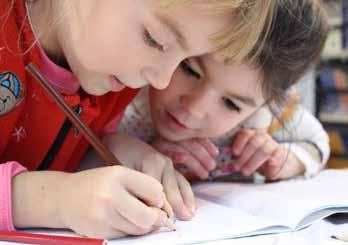
Important factors to consider when choosing the right school
So now you have the table filled with brochures of different schools and wonder what to look for. Keep in mind your family needs, and trust yourself to balance these with your child’s needs and with your search for a good quality school. Here are a few suggestions to help you make up your mind:
First: How much does the school cost?
Before spending time looking through school courses, you need to make sure that you can afford to send your child to the school. Local schools tend to be very affordable but annual tuition fees among international schools in Asia can range from $1,800 to $24,000. International schools have between three to four terms per school year and normally fees are paid termly. Some International schools allow parents to pay tuition fees monthly but if this is a requirement from you, you need to check with the school first to see if that is allowed.
Annual tuition fees are not a sure indicator that the more expensive the school is, the better education and experience your child will have. Smaller schools with fewer facilities can sometimes be less costly but they can still be an excellent choice with a more close-knit community within the school.
Second: How far away is the school from your home?
Another important factor that may eliminate a few options for you easily is how far away the school is located. Bear in mind that in most big cities, it is the traveling time between your home and the school that matters and especially in larger cities, you will be challenged by some very heavy rush hour traffic. How long will it take for your child to get to school and home afterward? How will your child be going there? Coordination if you have several children under education, etc.
Third: What reputation does the school have?
Talk to people as much as possible. This is where your first intuition comes in handy and if many say the same it is probably true. Don’t listen to opinions expressed by people who have no children at the school themselves - parents are quick to seek confirmation of their own choice by adopting opinions about the competing schools.
The age of the school is no sure indication either. Nothing guarantees that the reputation of a hundredyear-old school is better than a one-year-old school.
Fourth: What are the school’s fundamental principles?
Repeated, unbiased research shows that all truly outstanding schools adhere to certain principles. While all are important, the two most important factors are: 1. The school has high expectations for all students. It means all students are expected & helped to meet high minimum goals; goals are raised for individual students as soon as they are ready to learn beyond grade level.
Avoid schools that make excuses for kids who are behind academically. If your child struggles, they may make excuses rather than help your child, too. Also, avoid schools that pretend none of their students struggle. All schools have more than a few students who face learning challenges at some point. You need to know in advance how the school will respond. 2. The school monitors progress and adjusts teaching. It means the school assesses individual student progress often and changes teaching approaches to ensure that every child locks onto learning. This is especially important if your child is learning a new language as he or she may have mastered math in your native language, but having difficulties with mathematic terms in another language. Choose a school that will keep your child’s levels up but will adjust teaching approaches to make sure the right language skills are taught at the same time.
Avoid schools that say, “Our grade-level work is tough enough for all students” and schools where everyone makes grade level, but few kids score far above grade level. Both academically gifted children and motivated “typical” kids miss out in a school that is focusing on grade level only.
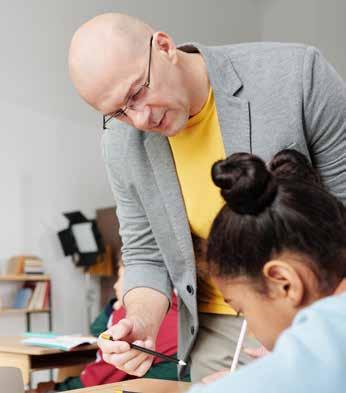
Fifth: How are the courses at the school and do they match my child’s needs?
All children need a school that will appropriately challenge and nurture them to succeed in core academic subjects, but research shows you can significantly improve your child’s life and school performance by choosing and working with the right school, so you have plenty of reasons to give it your best effort.
The school’s courses and programs will most likely be listed in the school’s information packages. They will talk about British Curriculum and American Curriculum and - what most Scandinavians these days go for - the IB curriculum.
This is important if you relocate in the future so choose what fits best with the school system back home. Both the British Curriculum and the American Curriculum, however, are recognized and accepted worldwide.
Ask questions about the tests and exams which are offered and used as an evaluation method. Some international schools require a certain level of English language skills before accepting new students and it is, therefore, an important factor to look into if your child has little or no English language skills. Some international schools offer pre-language courses to help your child to an easier start and some international schools offer private tutoring to help your child excel faster once accepted into the school. If your child is already a secondary school student, ask how well the graduating students do in getting accepted into major universities both in your current country, back home, and elsewhere overseas. You can also find out if the native language and culture of your child is taught as optional learning as your child needs to keep his or her ties to your cultural background. It is also important for you. If such optional learning is not offered, most Asian cities have local Scandinavian communities where native Nordic languages often are taught as an after-school activity.
Sixth: What other activities can the school offer your child?
Besides the fundamental course works, what kind of arts, sports, community service does the school offer? Are there proper facilities to support those activities?
It seems that schools almost compete with each other when it comes to sports, thus many schools will have gymnasiums and sports complexes, which are either new or remodeled. But maybe your child is more into other activities - computer programming, performing arts?
Most schools offer after-school/weekend programs as well as field trips and community services. You should be able to freely pick the activities that best suit your child.

Engaging in after-school activities is also an excellent way for your child to make new friends faster.
This is not as obvious as you may think. The school is most likely private and qualifications for employment are not always as strict as for schools back home. What educational degree do they hold? How long have they been teaching at the school? What kind of teaching methods do they prefer? Are they involved in planning and evaluating the curriculum? Will they be giving special attention to each child’s problems or personal needs? And more importantly, what do they do to make sure new students are welcomed and able to settle in the smoothest way possible.
Eight: What do the current students think of the school?
If it’s possible, talk to some of the existing students. Are they happy there? Do they look motivated to learn? How will the school help your child get started? Do they assign so-called “buddies” (another student from the same country) for new students? Most schools have established student organizations to provide service to students at a personal level. Here, students can get help with studying, working, individual needs, and so on.
Ninth: How is the relationship between the school and the parents?
You will obviously not be able to monitor your child in school. The teacher will have to be your eyes and ears. You must be notified of your child’s functionality regardless of grade, and regardless of whether it includes bad behavior or progress your child has made. Make sure that you can get informed as often as possible especially in the beginning to make sure your child settles in well at school. You may also join a parents’ volunteer program if available. Some schools may offer activities for the whole family as well.
Your most important task after selecting a school - watch your child!
Moving to a new country, enrolling at a new school, and having a daily life in another language is an adjustment especially for children. It is therefore important that you make a habit of spending more time than you used to back home talking to your child about how school was today. What they did in class, and what they did outside. Let her or him tell you about their new friends. Listen. All may initially sound fine and uncomplicated, but that may just be a honeymoon period. Your child will be filled with new impressions and new ways of doing things and therefore, this is the most important step of them all. If your child develops in any way you find disturbing or even develops signs of discomfort with going to school, you should think twice before you tell your child that “this is life - it is not always pleasant!”. Allow them to adjust, support them in their transition and understand that this may be hard for them. They might feel frustrated that they can not communicate as freely at school as they are used to in their native language so have patience with them. Help them establish friendships outside school by inviting classmates home for playdates as this also helps your child speak the language much faster.
The process of starting in a new school abroad can also be hard for parents so speak to other parents who have gone through the same and listen to their advice. Things might not happen as fast as you would like them too but trust the process. Accept that the transition takes time and remember that after a few months, most kids suddenly excel at life abroad.
Final thoughts
The perfect recipe for choosing the ‘ideal’ school for your child does not exist. Many parents simply go by their own parental instincts. This is natural, and there is certainly nothing wrong with trusting your own instinct in the process. After all, you should feel comfortable and confident in leaving your child at the school gate in the mornings. Never mind how diligent you do your homework - and maybe the above list is a bit excessive - you will never be able to foresee if your child will thrive at the school.
However, the few professional tips and suggestions above should give you some ideas about what to look for when making up your mind. Keep in mind the important role you are taking in deciding the right choice for your child’s new school will contribute to your child’s progress toward a crucial foundation and an enjoyable schooling experience.
Why International Education is Unique and Why Great Teachers are Essential

The very idea of an international school evokes an image of inclusion, and building bridges across cultures. It suggests a special passion for education from a dedicated, global community. At International School Bangkok (ISB), we embody this globallyminded approach to education with an emphasis on educating the whole child and defining the essential attributes and values we want every child to take away from their time at our school. Combining these forward-thinking ideals with the extensive experience that our diverse group of teachers bring to each class and classroom setting – we create environments where students learn while they form bonds of empathy with people from different backgrounds.
Our teachers strive to provide the best environment for students to develop, learn and grow. Through a variety of creative approaches to learning, teachers engage students through experiential-learning that inspires curiosity and determination, while teaching them to be self-managing, courageous and adaptable.
Excellence in the classroom
A well-designed system of education and support can help children engage more deeply with their studies. But in the end, a classroom can only be as good as the teacher who leads it.
Our dedicated staff at ISB are actively involved in developing each student according to their strengths, so they can achieve their personal and academic potential. Our entire faculty is committed to helping them find their way forward in life, as they grow into passionate, reflective and caring global citizens.
Exceptional teachers love working with children, they see teaching as the highest calling and are dedicated to providing relevant learning opportunities for every student: •They are creative and innovative •They work hard to know their students as learners and people, they study their content and design intentional learning opportunities that motivate students while improving learning •They are true learners themselves, seeking opportunities to improve their craft and become even better at what they do for students •Their beliefs align with ISB’s vision, values, and focus on learning
International education offers a unique setting where multiculturalism, world-wide experience and a passion for education can thrive – a community made up of teachers, staff and students from all around the globe.
Bringing you the best
By selecting International School Bangkok (ISB) students benefit from the vast and diverse experiences of the very best teachers from around the world. Our teachers bring original ideas and viewpoints, unique cultural insights, and a variety of effective approaches to teaching, in order to spark academic curiosity and personal development.
Finding the right teachers and developing them through the ISB system is therefore our highest priority. When we recruit new teachers, we carefully screen every candidate for experience, proven success, collaborative spirit, alignment to our mission and values, and an attitude of caring for students through compassionate practices.
Through the interview process, we make sure that each of our teacher candidates embodies the core values of ISB. They must show care, responsibility, commitment, gratitude, courage, balance, respect, and integrity, not only in their approach to teaching and education, but in their personal lives as well.
ISB is much more than a school; it is a lifestyle, and we want all of our teachers and students to feel this is a place where they truly belong – a place that they can call home.
SHREWSBURY’S EARLY OFFERS TO WORLD-CLASS UNIVERSITIES

• Two Cambridge and Three Oxford offers • US offers include Stanford, Cornell, UPenn, Northwestern, Tufts so far • 1:7 graduates to attend medical school in Thailand and UK
Whilst excitement builds enhancing the school’s unparalleled around the August reputation for academic excellence opening of a new 1.1 and university success. billion THB Innovation Building Despite the continued disrupand Sports Performance Complex, tion of COVID-19 for university Shrewsbury International School’s hopefuls around the world, ShrewsClass of 2021 are already celebrating bury has continued to support stuearly offers from some of the world’s best universities, further dents in their applications to leading institutions. Over 300 offers have SHR Senior School 2021 - Scan Asia been received so far - including several of the most highly-ranked universities and colleges in the world; a true testament to the hard work and dedication of Shrewsbury’s outstanding students and staff. A full list of offers is expected by May.
This year, at least 14 students will start their journey to becoming doctors in Thailand and overseas. An area of significant expertise at Shrewsbury, one in seven students from the graduating Class of 2021 will begin their higher education at medical school. In particular, these achievements highlight the considerable efforts made by Shrewsbury’s award-winning Higher Education (HE) team, who continue to represent students and give them the best chance of accessing the university programmes of their choice.
To read more about the Class of 2021, their achievements and university offers so far click here.
Investing in Excellence

Grow with us at Thailand’s Most Successful International School
Call, Tour, Apply: 02 675 1888
Places available in selected year groups
B | 1.1 BILLION NEW FACILITIES OPENING AUGUST 2021
17,000 sqm Innovation Building: Top specification Science, Mathematics, Computing, Robotics and Innovation Spaces 4,000 sqm Sixth Form and University Counseling centre 4,000 sqm Sports Performance Complex
enquiries@shrewsbury.ac.th www.shrewsbury.ac.th/riverside @SHBriverside Charoenkrung-Sathorn
Flourishing Relationships Promote Learning for Young Children



Obstacle courses, balance bridges, water channels, mud kitchens, a sensory stream, sand pits, den building kits, bubbles and outdoor musical instruments — these are some of the features of Bangkok Patana School’s outdoor learning environment. Here, young students build contraptions that they then have the freedom to play in any way they wish, take risks and express themselves.
At Bangkok Patana School, relationships flourish to their full potential. Whether it’s peer to peer, senior and junior or teacher and student, young learners have several avenues for communication, support and camaraderie. Teachers aren’t just lecturing one-way in classrooms, they are co-constructors who work alongside pupils. Children aren’t just receiving information with no autonomy over their learning — they lead their learning, while adults play a supporting role. “In this way, children begin to realise that their interests and what they want to do are valued and they feel like an important and valued member of the community and feel confident to share their interests, their ideas and their thoughts, rather than waiting to be told by their teacher that they can speak,” explains Sarah Gaughan, Leader of Learning and Strategic Development in Foundation Stage. This approach reflects the holistic and innovative education that takes place at one of the most respected educational establishments in South East Asia. A Bangkok Patana education provides intellectual, physical and social preparation for the future. The school has remained at the forefront of education in Thailand as the country’s original British international school for students from two to 18 years old. Close to nine in ten of the faculty members here come from the UK or British international schools.
The school follows a modified English National Curriculum up to Year 11 and the International Baccalaureate in Years 12 and 13. These are paired with comprehensive arts and athletics programmes. The result of this broad-based and rigorous combination of study, play and exploration develops reflective and inquisitive students with a love for learning.

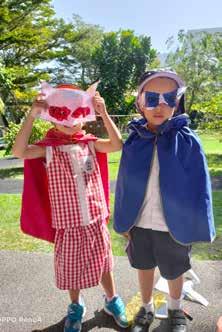
Excellence at every level for every interest
There’s never a dull day at Bangkok Patana School. With its fluid and contemporary approach to education, pupils truly get to learn in the moment and to capture their curiosity.
Bangkok Patana’s youngest learners have the opportunity to be independent in everything that they do, even if they pose some element of struggle and challenge. “We don’t fasten their shoes for them or put on their hats. We let them learn so they can develop control of their body,” shares Gaughan. “If that takes 20 minutes with support and guidance, then that is a learning moment rather than just a routine.”
Purposeful Play
Why exploring the power of play is so important in children’s early development
Learning through inquiry and purposeful play lies at the heart of a student’s kindergarten education at the Canadian International School (CIS). Angela Hollington, Kindergarten and Primary School principal at CIS’ Lakeside campus, talks about the benefits of this approach and what it looks like in CIS’ kindergarten classrooms.

What’s the most rewarding part of being a kindergarten principal?
I love seeing the curiosity that young children have in the world around them. The sheer joy of learning and discovery is exciting to be around; it inspires me!
What are the key objectives of CIS’s kindergarten programme?
To develop each child’s potential and develop their curiosity and excitement in learning. Our goal is to equip them with the necessary skills (physical, emotional and intellectual) to succeed through their school life and beyond as the world changes and adapts to new learning.
Our programme, based on the IB PYP framework, combines a range of subjects including STEAM (science, technology, environment, arts, maths), outdoor learning experiences and a first-rate literacy, math and foreign languages programme. (All children must learn either Chinese or French; we offer daily language acquisition classes and also a unique Chinese-English bilingual programme.) We focus on the individual child with the aim of helping them reach their full potential, no matter their strengths and interests.
What are the benefits of adopting an inquiry, play-based teaching approach?
Research shows young children learn best through play. It allows them to experiment, hypothesise and make sense of the world around them. They develop solid cognitive skills in all areas, generate their own ideas and become confident individuals who are intellectually curious.
What does this type of learning look like in your classrooms?
spaces designed to provoke inquiry. Children are absorbed in their learning and encouraged to experiment, explore new concepts, ask questions and talk about what they are doing with their friends and teachers. This promotes lots of discussion and develops their thinking.
Developing key language and numeracy skills are an essential part of our Kindergarten programme and cultivated in our young students through a play based context. For example, one day we might recreate a mini hawker centre where they set prices, write menus and talk to make-believe customers. During the process they will practise their counting, reading and writing; they’ll also sharpen their problem-solving skills and their ability to predict the actions and feelings of others.
Find out more:
CIS holds regular Open House days for their Lakeside and Tangjong Katong campuses. Contact their Admissions hotline on +65 6734 8088 or keep an eye out on their website at www.cis.edu.sg/admissions for details, and the opportunity to meet the principal, tour the campus and experience some hands-on, teacherled activities.

The Learning Journey:
How Your Child Continues to Achieve Their Potential
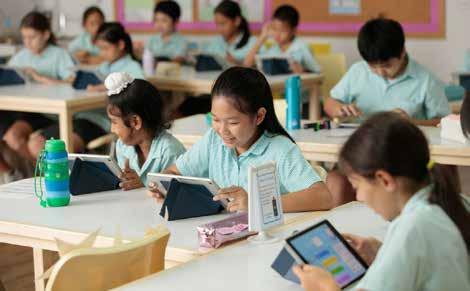
Around the world, many of us are currently experiencing a time of uncertainty. The big changes which have occurred this year have affected the way almost all of us work, study and live. Throughout this period, delivering quality teaching and our full curriculum of education has remained our top commitment. Whether in the classroom or learning with us through our virtual school - each individual student, their unique learning journey and their academic goals are at the heart of what we do.
Sustaining Excellence
What do we mean when we describe learning as a ‘journey’? It is the idea that the learning cycle is never linear for any child, it naturally fluctuates. In the classroom or through virtual schooling, every student experiences times of acceleration and others which are more challenging. Despite this year presenting its own unique challenges, this remains true of how students learn and it is our teaching approach that is key to nurturing this process.
Our teachers are experts in identifying the gaps in a child’s understanding of a topic and personalising their approach to help them reach their targets. We have trained, and continue to develop, all of our teachers so that they are prepared and skilled in identifying where a child needs more support, regardless of environment. Most crucial to this is the quality time between teacher and student - so it is part of our standard programme that all teachers carve out opportunity with individual students to continually assess their progress and needs.
We also creatively adapt our lessons and resources so that any lesson a teacher would deliver in the classroom can be successfully delivered virtually too. This means that even if external scenarios suddenly change, students do not experience a break in curriculum or have a gap in subject knowledge. Similarly, students also have unlimited access to their Global Campus, a Nord Anglia dedicated learning platform, on which they can collaborate with their peers around the world and access extra curricular activities from wherever they are.
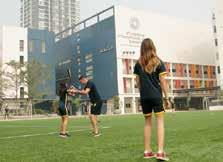

Preparing for the Future
We are continually assessing how we can deliver, adapt and improve our offering for students and parents. We recognise that communication with parents on their child’s development is a key element in helping every student to achieve their very best. Parents Evening remains a staple date in the school calendar. To better this and ensure preparedness for the months ahead, we have now also introduced opportunities for parents to meet with teachers virtually. These allow our parents to catch up one-to-one with their child’s teacher at a time which suits their daily schedule.
We continue to evolve our online learning platform. These developments will further improve the smoothness of learning so that recordings of classroom lessons and virtual lessons are both accessible via one single, easy to use platform. This new addition to our teaching programme will ensure continuity of learning and improve clarity for students, particularly if it is necessary for learning environments to be flexible.
Learn More
St Andrews International School Bangkok is committed to ensuring all our students achieve their desired results and are prepared for their global opportunities ahead. To find out more about how we are ensuring academic excellence at our school, visit www.standrews.ac.th/ seniorstudies.
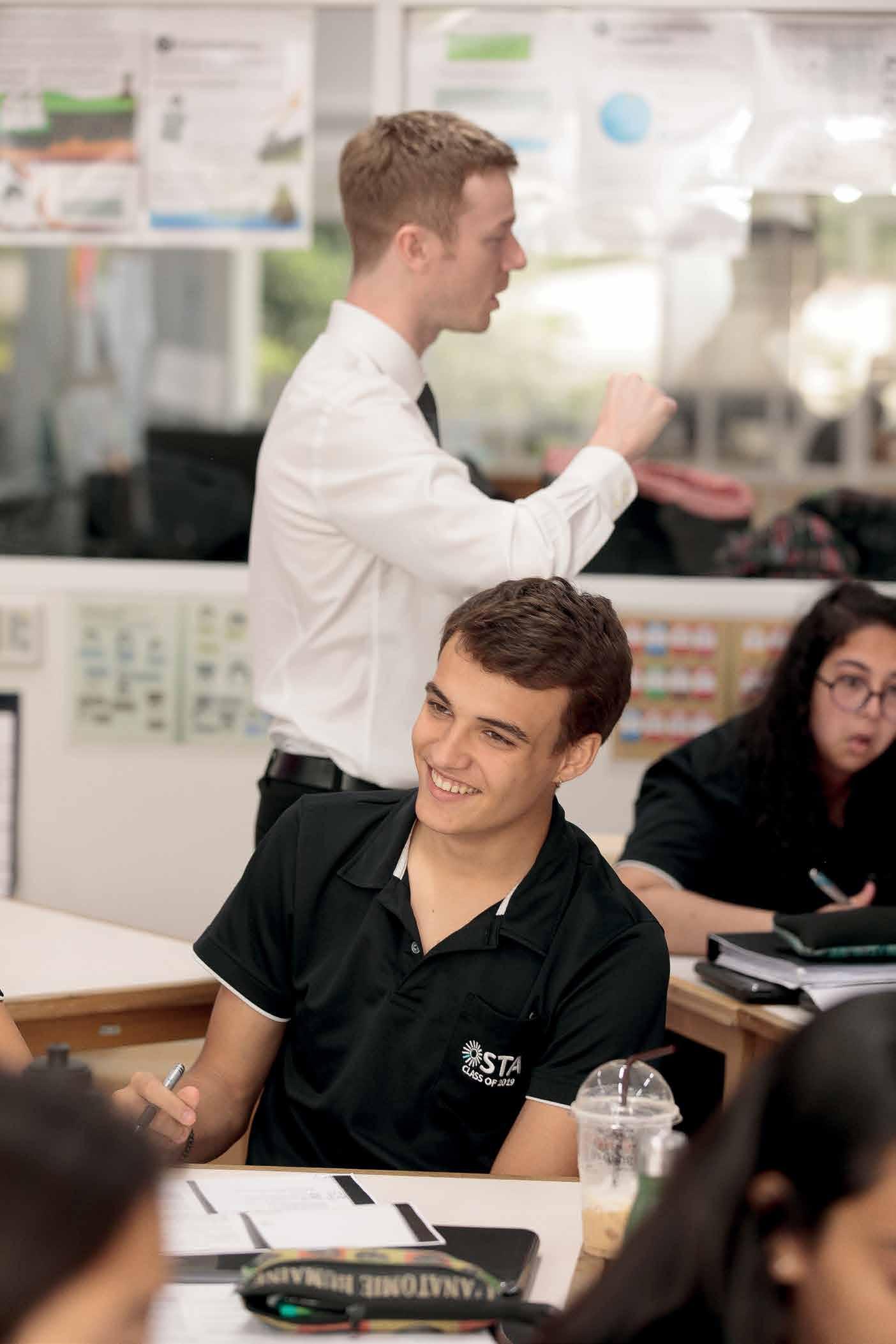
by Thomas Banyard, Headmaster, King’s College International School Bangkok

At King’s College International School Bangkok, teachers work hard so that happy children grow into successful adults who make a positive difference to society. At the end of our first term, 100% of parents reported that their child was happy to come to school and that they were happy with their well-rounded development. Having 25 nationalities allows our students to experience a truly diverse community based on the values of kindness, good manners and wisdom. So why do we feel that education is the best thing we can give our children?
With the rise of AI, the increased need to harness technology, and globalisation, our children’s workplace will be different from ours. We do not know what challenges our children will face, but they will need to work with a diverse range of people, understand other cultures, and value difference. Our students make friends from different backgrounds and collaborate with students around the world. As well as their classmates, we are fortunate to be in a network of schools with campuses in the UK, China and France, with more planned in the future. The chance to work with children living elsewhere, to go on exchanges and to build networks, is fantastic preparation for a 21st century career.
However, world-class education goes beyond exposure to different countries and cultures. On top of this, our students must have a clear values framework so that they know how to interact, work with and respect people from any walk of life. King’s Bangkok students are taught how to build positive relationships and to empathise, an essential skill for today’s leaders.
Alongside an international mindset and a values-driven approach must be rigorous academic standards. We are fortunate to have the full support of King’s Wimbledon, which is one of the world’s most academically successful schools. We have developed their curriculum, structures and policies to build on nearly 200 years of experience. Furthermore, they helped us recruit the best possible teachers by interviewing all of our classroom teachers to ensure parity across the schools. In fact, we will have 6 teachers who previously taught at King’s Wimbledon; four of them including myself will teach Physics, Chemistry, Biology and Maths in the senior school this August. With their support and our focus on mastery of the English language, we will ensure that our children go to the best universities. If you are interested in finding out more about the education we offer, please visit our beautiful campus in the Rama 3 area.
info@kingsbangkok.ac.th 02 481 9955 www.kingsbangkok.ac.th





Outdoor Learning
- why it is important now more than ever
From early years to IB, Outdoor learning has an integral place in every student’s learning journey. Learning that takes place beyond the classroom provides unique and memorable learning experiences that enhances academic ability, well being and environmental stewardship. Here are just a few of the benefits of outdoor learning. Creating memorable learning experiences
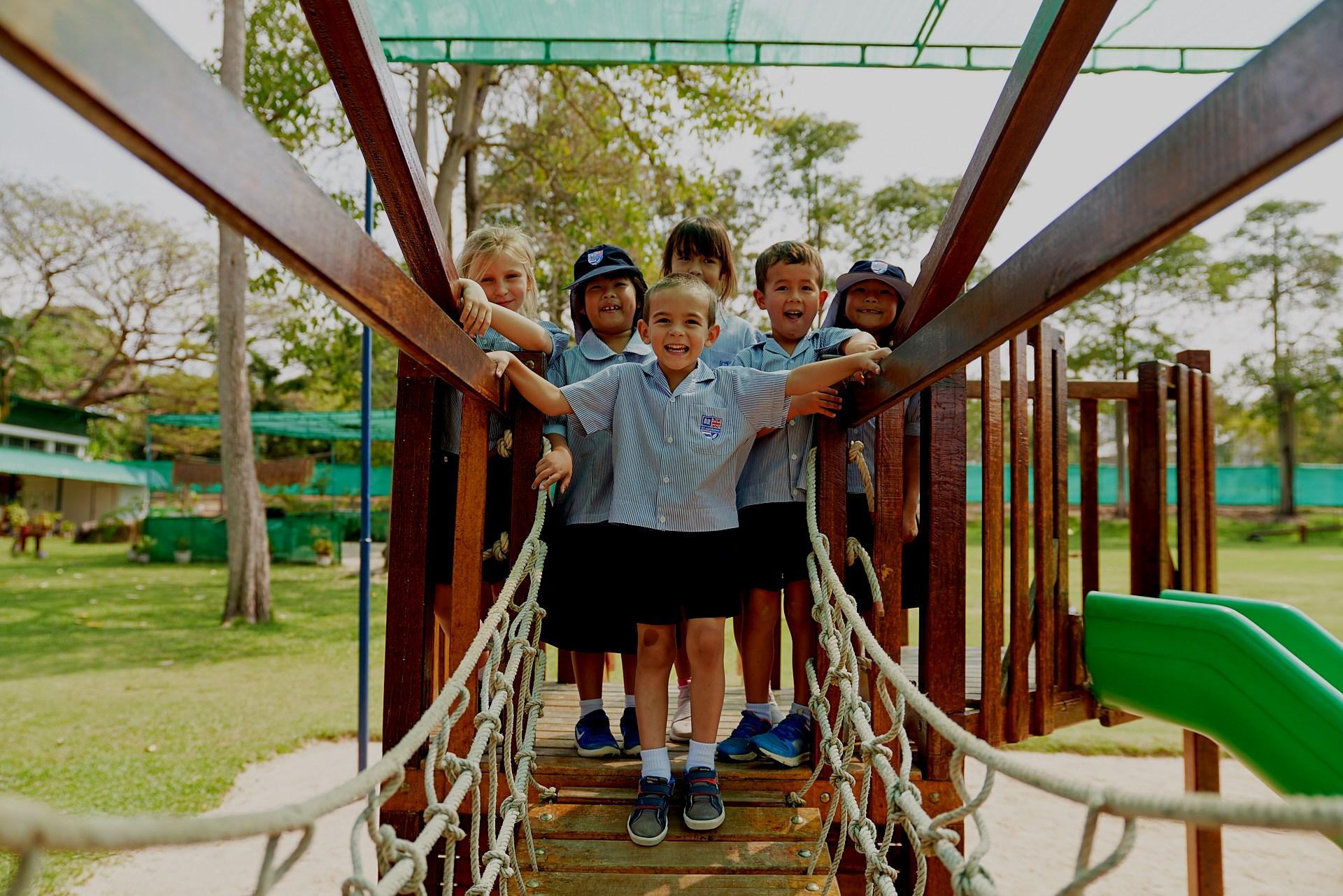
Research suggests that learning that takes place in a variety of environments helps to create novelty, which allows a space for students to draw on their learning experience at a later date. Learning outside of the classroom can create opportunities for deeper understanding of the topic through hands-on activities. Such activities create an engaging experience which allows children to actively embrace the skill at hand and remember those skills as part of the experiential learning activity. The result is that children are later able to recall the skills and knowledge that was learnt whilst simultaneously recalling the fun experience they had while learning it! This experiential learning has been a foundation of pedagogy since the times of Aristotle, and has been a golden thread in the foundations of education philosophy around the world.
Outdoor learning aids the transfer of knowledge
Experiential interactions enhance children’s levels of meta-cognition, reflective thinking and transfer of knowledge. A lesson learnt during an outdoor experience will be a lesson transferred into many aspects of one’s life. Through outdoor learning, children learn to understand their character and their limits, whilst also having the opportunity to reach their full potential and embrace all that their environment has to offer them. They will learn to be confident in the face of new challenges, whilst simultaneously being assured in their own ability. The Hunger Games novels, for example, highlights the importance of survival skills over combat skills. As part of their curriculum, students learn that the outcome of many historical events, such as wars, were often due to the inability to meet the basic needs of survival rather than to combat. Students can reinforce this knowledge through their own outdoor understanding of basic survival skills, and can in turn gain an empathy and deeper understanding of historical events whilst being able to use this experience in English comparisons.
It is well known that spending time outdoors helps us to connect with others, ourselves and the environment. It has also been shown to increase mindfulness, and even scientifically revitalises the body! Studies find that more time outdoors promotes happiness, boosts energy and helps with getting a good night’s sleep; but it also helps us to appreciate the environment and encourages us to care for it! More often than not, schools are working to integrate the outdoor environment into curriculums around the world. The St Andrews International Schools Group, Thailand, are on the forefront of outdoor education, with outdoor assemblies and integrated forest school curriculums, as well as some of the most unique outdoor school environments in Thailand. Outdoor learning is embraced and children benefit from regular interactions with nature. So, what’s stopping you from learning outdoors today?

BTEC: Follow your Path, Achieve your Full Potential
Bangkok Prep’s reputable BTEC Level 3 programme for Years 12-13 opens a host of possibilities for students with hands-on practical experience.

The Premier League and FIFA Club World Cup Champions have partnered with Pearson for a new Business Technology Education Council (BTEC) International Level 3 qualification in Sport: a qualification your teenager could opt for in Years 12 and 13 along with other A Level subjects – an option offered at Bangkok Prep.
Besides Sports, Bangkok Prep also offers BTECs in Travel & Tourism and Business.
What’s a BTEC, you ask? The career-focused BTEC (Business Technology Education Council) programme qualification offers a direct pathway to a ‘chosen career through practical experience and study’. The A Level, in contrast, is designed for an in-depth academic immersion in a chosen subject. Here, the focus is entirely on academics with assessments often based on a few major examinations. Sarah Dixon, who leads the BTEC programme at Bangkok Prep, mentioned that studying for a BTEC may naturally suit students who learn in a different way: ‘some students are very good at sitting exams, but there are also many talented students who enjoy learning by doing practical coursework in the subject area they are really passionate about. A BTEC programme may definitely be the answer for them.’
So, which do you choose? Luckily, this is not an either/or situation. A student can opt for a mix of compatible A Level and BTEC

qualifications. What the BTEC option does, in brief, is open a host of new possibilities and career paths, expanding their horizons. Crucially, it also keeps the pathways to higher studies wide open.
To get back to Liverpool Football Club and its partnership with Pearson: What does it mean for those aspiring to careers in the global sports industry? This BTEC Level 3 qualification at Bangkok Prep includes real-life content from Liverpool Football Club, offering multiple pathways and career opportunities: Sport; Sport Fitness Instructing and Personal Training; Sport Coaching and Development; Sport Business and Management; and Sports Facilities Operations and Management.
Billy Hogan, Chief Executive Officer of Liverpool Football Club, explains it best: ‘We are excited about this partnership with Pearson. It will help open up new global career opportunities and develop sports education around the world by helping young people get their foot on the career ladder by creating pathways into the workplace.’
Take the Sport Business and Management pathway, for example. Its multifaceted curriculum prepares students for careers not only in Sports Business Management but also in Sports Journalism. Equipped with skills acquired and knowledge gained, this BTEC Level 3 also keeps the pathways to higher studies wide open. Besides empowering students with the skills and ability that employers truly value. Rinchen, a current student on the course, told us that ‘sports facilities at Bangkok Prep are world class. We are so fortunate to have high level coaches and fantastic, highly experienced BTEC teachers from the UK. ’
Bangkok Prep’s on-campus facilities make the BTEC an excellent option. Learners taking a BTEC course are assessed regularly and awarded marks that all add to the final grade. Some subjects, though, have smaller externally marked assessments. There are plenty of opportunities to learn, improve and succeed. It is also important to note that more than 70 countries recognise the Pearson BTEC qualifications offered at Bangkok Prep.
This brings you the question: which BTEC is the most suitable as a pathway to higher studies? Work your way backwards. If your teenager knows the career path he or she wants to take and has earmarked the universities or courses of choice, check the A Levels and BTEC combination required. If that choice has not been made, choose a combination that would open up the field.
The strengths of a BTEC cannot be ignored. It is designed to empower students with enviable cognitive, problem-solving and interpersonal skills. Students also develop intrapersonal skills like selfmanagement, adaptability, resilience, self-monitoring and development. Plus, they learn to work independently, be methodical, do research, give presentations and be active group members. All skills that universities value immensely.
Frankly, the choice comes down to what motivates your teenager. The right choice could open the portal to a host of possibilities.


BTEC Video
Admissions Enquiry Form


How to discipline your child the smart way
Positive discipline for better mental and physical health and a happy childhood.
There comes a time when every parent struggles with how best to discipline their child. Whether dealing with a screaming toddler or an angry teen, it can be hard to control your temper. No parent wants to find themselves in such a situation and the bottom line is that shouting and physical violence never helps.
Thankfully, there are other, more effective ways and one of them is positive discipline.
Lucie Cluver, Oxford University professor of Child and Family Social Work and mother of two young boys, explains in this article first published by UNICEF how positive discipline can help parents build positive relationships with their children and teach skills like responsibility, cooperation and self-discipline.
Why positive discipline?
“Parents don’t want to shout or hit their kids. We do it because we’re stressed and don’t see another way,” says Professor Cluver.
The evidence is clear: shouting and hitting simply do not work and can do more harm than good in the long run. Repeated shouting and hitting can even adversely impact a child’s entire life. The continued “toxic stress” it creates can lead to a host of negative outcomes like higher chances of school dropout, depression, drug use, suicide and heart disease.
“It’s like saying: here’s this medicine, it’s not going to help you and it’s going to make you sick,” says Professor Cluver.
“When we know something doesn’t work, that’s a pretty good reason to look for a different approach.”
Rather than punishment and what not to do, the positive discipline approach puts an emphasis on developing a healthy relationship with your child and setting expectations around behaviour. The good news for every parent is it works and here’s how you can start putting it into practice:

There are no bad children, only bad behaviour.
1. Plan 1-on-1 time
One-on-one time is important for building any good relationship and even more so with your children.
“It can be 20 minutes a day. Or even 5 minutes. You can combine it with something like washing dishes together while you sing a song or chatting while you’re hanging out the washing,” says Professor Cluver.
“What’s really important is that you focus on your child. So, you turn your TV off, you turn your phone off, you get to their level and it’s you and them.”
2. Praise the positives
As parents we often focus on our children’s bad behaviour and call it out. Children may read this as a way to get your attention, perpetuating poor conduct rather than putting a stop to it.
Children thrive on praise. It makes them feel loved and special.
“Watch out for when they’re doing something good and praise them, even if that thing is just playing for five minutes with their sibling,” recommends Professor Cluver. “This can encourage good behaviour and reduce the need for discipline.”
3. Set clear expectations
“Telling your child exactly what you want them to do is much more effective than telling them what not to do,” says Professor Cluver.
“When you ask a child to not make a mess, or to be good, they don’t necessarily understand what they’re required to do.” Clear instructions like “Please pick up all of your toys and put them in the box” set a clear expectation and increase the likelihood that they’ll do what you’re asking.
“But it’s important to set realistic expectations. Asking them to stay quiet for a whole day may not be as manageable as asking for 10 minutes of quiet time while you have a phone call,” says Professor Cluver.
“You know what your child is capable of. But if you ask for the impossible, they are going to fail.”
When your child is being difficult, distracting them with a more positive activity can be a useful strategy says Professor Cluver.
“When you distract them towards something else – by changing the topic, introducing a game, leading them into another room, or going for a walk, you can successfully divert their energy towards positive behaviour.”
Timing is also crucial. Distraction is also about spotting when things are about to go wrong and taking action. Being mindful of when your child is starting to become fidgety, irritable or annoyed, or when two siblings are eyeing the same toy, can help diffuse a potential situation before it becomes one.
5. Use calm consequences
Part of growing up is learning that if you do something, something can happen as a result. Defining this for your child is a simple process that encourages better behaviour while teaching them about responsibility.
Give your child a chance to do the right thing by explaining the consequences of their bad behaviour. As an example, if you want your child to stop scribbling on the walls, you can tell them to stop or else you will end their play time. This provides them with a warning and an opportunity to change their behaviour.
If they don’t stop, follow through with the consequences calmly and without showing anger, “and give yourself credit for that – it’s not easy!” adds Professor Cluver.
If they do stop, give them lots of praise for it, recommends Professor Cluver.
“What you are doing is creating a positive feedback loop for your child. Calm consequences have been shown to be effective for kids to learn about what happens when they behave badly.”
Being consistent is a key factor in positive parenting, which is why following through with the consequences is important. And so is making them realistic.
“You can take a teenager’s phone away for an hour but taking it away for a week might be difficult to follow through on.”
Engaging with younger children
One-on-one time can be fun – and it’s completely free! “You can copy their expressions, bang spoons against pots, or sing together,” adds Professor Cluver. “There’s amazing research showing that playing with your children boosts their brain development.”
Engaging with older children
Like younger children, teenagers seek praise and want to be thought of as good. One-on-one time is still important to them.
“They love it if you dance around the room with them or engage in a conversation about their favourite singer,” says Professor Cluver.
“They may not always show it, but they do. And, it’s an effective way of building a relationship on their terms.”
While setting expectations, “ask them to help make some of the rules,” suggests Professor Cluver.
“Sit them down and try to agree on the household dos and don’ts. They can also help decide what the consequences for unacceptable behaviour will be. Being involved in the process helps them know that you understand they’re becoming their own independent beings.”
Advice for parents during the COVID-19 pandemic
The pandemic has brought about sudden and drastic changes in the lives of families with parents directly in the middle of it. Here are some tips that can help parents get through these and any other stressful times:
1. Pause We all know the stress when we feel our child is being difficult. At moments like these, being present and stepping back is a simple and useful tactic. Hit the “pause button”, as Professor Cluver calls it. “Take five deep breaths, slowly and carefully and you’ll notice you are able to respond in a calmer, more considered way. Parents across the world say that just taking that pause is enormously helpful.”
2. Step back Parents often forget to care for themselves, says Professor Cluver.
“Take some time for yourself, such as when the kids are asleep, to do something that makes you feel happy and calm. It’s really hard to do all the things right as a parent, when you haven’t given yourself a break.”
3. Praise yourself It’s easy to forget the astonishing job you do as a parent every day and you should give yourself the credit, advises Professor Cluver.
“Each day, maybe while brushing your teeth, take a moment to ask: ‘What was one thing I did really well with my kids today?’ And, just know that you did something great.”
“We might be in and out of isolation, but you are absolutely not alone,” she says.
“Millions of parents across the world are all trying and we’re all failing sometimes. And then we’re trying again. We’ll survive this together.”
Source: https://www.unicef.org/parenting/childcare/how-discipline-your-child-smart-and-healthy-way

Four things you can do to support your teen
Show your teenager love and care, while looking after yourself.
Whether you and your teen are getting along well or having challenges, it is important to show that you love and support them, that you can help them navigate tough times and that you are always there for them.
Here are four things to keep in mind when having that ‘how-are-you-doing?’ conversation with your teen and to show that you are always there for them.
1. Encourage them to share their feelings
• Look for ways to check in with your teen. Ask them how their day has been and what they have been doing. It could be by inviting them to join you in a task, such as preparing dinner, so you can use the time to chat about their day. • Remind them that you are there for them, no matter what, and that you want to hear how they are
feeling and what they are thinking. A few simple words of encouragement can help them feel comfortable sharing their feelings with you. • It is important to acknowledge and understand emotions they might be experiencing, even if it feels uncomfortable. When they open up to you, you can respond with “I understand”, “it sounds like a difficult situation” or “that makes sense”. • It can be easy to notice the things your teen is doing that you do not like. But also try to notice and praise them for something they are doing well - even something simple like cleaning up after themselves.
2. Take the time to support them
• Work together on setting up new routines and achievable daily goals. You could fit in home chores around school work or set a target like getting homework done before dinner.
• Adolescence means independence! Try to give your teen the appropriate time and space to be on their own. Needing space is a normal part of growing up. • Find a few ways you can support and encourage your teen to take breaks (from schoolwork, housework, or other activities they may be working on) to do things they enjoy. If your teen feels frustrated, work with them to brainstorm some solutions to problems. Try not to take over and tell them what to do.
3. Work through conflict together
• Listen to your teen’s views and try to sort out conflict calmly. Remember: everyone gets stressed! • Never discuss an issue while you are angry. Walk away, take a breath and calm down — you can talk with your teen about it later. • Avoid power struggles. With the world feeling unpredictable and options looking limited right now, teens might be struggling to be in control. As difficult as it can be in the moment, empathize with their desire to assert control in a scary time, rather than attempting to fight back or overpower it. • Be honest and transparent with your teen: you can let them know that you are experiencing extra stress as well. Showing them how you deal with your own difficult feelings can help them know their feelings are okay. • When there is conflict, take some time to reflect on how you and your teen can resolve it. You can discuss these reflections with your teen, so they see how you are processing ideas. Caregivers have a lot to deal with. You also need care and support for yourself. Showing self-care is also a good way of modelling the practice to your teen.
Don’t wait to ask others for help if you are feeling overwhelmed. It is normal and okay to feel this way. Find a family member or someone you can talk to. Make time for your own relationships. Try to find a few people that you can share feelings and experiences with. Set aside some time with them each day, to check in on how you are feeling.
Make time in your day to do the things that help you cope with and manage stress. Whether your day is busy or slow, we know that making time to look after yourself is essential for your wellbeing. Doing the things you like or simply taking a few minutes off from your day can help you feel relaxed and re-energized.
Try different positive coping strategies that work for you. Some ideas include: exercising, talking with friends, making to-do lists or planning ahead, maintaining routines and structures, reflecting on what you are grateful for or proud of, and doing things you enjoy like music, art, dancing and keeping a journal.
Messages in this guide developed by the Inter-agency Standing Committee Mental Health and Psychosocial Support Reference Group.
Source: https://www.unicef.org/parenting/health/four-thingsyou-can-do-support-your-teens-mental-health

Coronavirus parenting tips

In this article, UNICEF has teamed up with the Parenting for Lifelong Health initiative to bring parents and caregivers a set of handy tips to help manage this new (temporary) normal.
The coronavirus disease (COVID-19) pandemic has upended family life around the world. School closures, working remote, physical distancing — it’s a lot to navigate for anyone, but especially for parents. Below you will find expert tips to help you deal with COVID-19 parenting challenges.
1. Talking about COVID-19
Be willing to talk about what Covid-19 is. They will already have heard something. Silence and secrets do not protect your children. Honesty and openness do. Think about how much they will understand. You know them best.
Be open and listen: Allow your child to talk freely. Ask them open questions and find out how much they already know.
Be honest: Always answer their questions truthfully. Think about how old your child is and how much they can understand.
Be supportive: Your child may be scared or confused. Give them space to share how they are feeling and let them know you are there for them. It is OK not to know the answers: It is fine to say “I don’t know, but we can ask Google.” Use this as an opportunity to learn something new with your child!
Heroes not bullies: Explain that COVID-19 has nothing to do with the way someone looks, where they are from, or what language they speak. Tell your child that we should be compassionate to people who are sick and those who are caring for them. Look for stories of people who are working to stop the outbreak and are caring for sick people.
There are a lot of stories going around. Some may not be true. Use trustworthy sites like UNICEF and the World Health Organization.
End on a good note: Check to see if your child is okay. Remind them that you care and that they can they can talk to you anytime. Then do something fun together!
2. One-on-one time during COVID-19
Can’t go to work? Schools closed? Worried about money? It is normal to feel stressed and overwhelmed.
School shutdown is also a chance to make better relationships with our children and teenagers. One-onOne time is free and fun. It makes children feel loved and secure, and shows them that they are important.
Set aside time to spend together. It can be for just 20 minutes, or longer – it’s up to us. It can be at the same
Ask your child what they would like to do. Choosing builds their self confidence. If they want to do something that isn’t OK with physical distancing, then this is a chance to talk with them about this.
Ideas with your baby/toddler • Copy their facial expression and sounds. • Sing songs, make music with pots and spoons. • Stack cups or blocks. • Tell a story, read a book or share pictures.
Ideas with your young child • Read a book or look at pictures. • Make drawings with crayons or pencils. • Dance to music or sing songs! • Do a chore together – make cleaning and cooking a game • Help with school work.
Ideas with your teenager • Talk about something they like: sports, music, celebrities, friends. • Cook a favorite meal together. • Exercise together to their favorite music. Listen to them, look at them. Give them your full attention. Have fun!
3. Keeping it positive during the pandemic
It‘s hard to feel positive when our kids or teenagers are driving us crazy. We often end up saying “Stop doing that!”. But children are much more likely to do what we ask if we give them positive instructions and lots of praise for what they do right.
Say the behaviour you want to see: Use positive words when telling your child what to do; like “Please put your clothes away” (instead of “Don’t make a mess”).
It’s all in the delivery: Shouting at your child will just make you and them more stressed and angrier. Get your child’s attention by using their name. Speak in a calm voice.
Praise your child when they are behaving well: Try praising your child or teenager for something they have done well. They may not show it, but you’ll see them doing that good thing again. It will also reassure them that you notice and care.
Get real: Can your child actually do what you are asking them? It is very hard for a child to keep quiet inside for a whole day but maybe they can keep quiet for 15 minutes while you are on a call.
Help your teen stay connected: Teens especially need to be able to communicate with their friends. Help your teen connect through social media and other safe distancing ways. This is something you can do together, too! COVID-19 has taken away our daily work, home and school routines. This is hard for children, teenagers and for you. Making new routines can help. Create a flexible but consistent daily routine • Make a schedule for you and your children that has time for structured activities as well as free time.
This can help children feel more secure and better behaved. • Children or teenagers can help plan the routine for the day – like making a school timetable. Children will follow this better if they help to make it. • Include exercise in each day - this helps with stress and kids with lots of energy at home. Teach your child about keeping safe distances • If it is OK in your country, get children outside. • You can also write letters and draw pictures to share with people. Put them up outside your home for others to see! • You can reassure your child by talking about how you are keeping safe. • Listen to their suggestions and take them seriously.


Make handwashing and hygiene fun • Make a 20-second song for washing hands. Add actions! • Give children points and praise for regular handwashing. • Make a game to see how few times we can touch our faces with a reward for the least number of touches (you can count for each other). You are a model for your child’s behaviour • If you practice keeping safe distances and hygiene yourself, and treat others with compassion, especially those who are sick or vulnerable – your children and teenagers will learn from you. • At the end of each day, take a minute to think about the day. Tell your child about one positive or fun thing they did. Praise yourself for what you did well today. You are a star!
5. Learning through play
Millions of children face school closure and isolation in their own home. This tip is about learning through play – something that can be fun for all ages! Types of play • There are so many different types of play that can be both fun AND educational. • Language, numbers, objects, drama and music games give children opportunities to explore and express themselves in a safe and fun way. Movement games • Create a dance choreography to your children’s favourite songs. One person does a dance move
and everyone else copies. Everyone takes turns being the leader. • “Challenge” who can do the most toe touches – jumping jacks, windmill toe touches in a minute. • “Mirror” each other – facial expressions, movements, sounds. One person can start as the leader and then switch. Try it with no leaders! • Freeze dance: Play music or someone sings a song, and everyone dances. When the music stops, everyone must freeze. Last person still dancing becomes the judge for the next round. • Animal dance: Same as above but when the music stops, call out a name of an animal, and everyone has to become that animal. Telling stories • Tell your children a story from your own childhood. • Ask your children to tell you a story. • Make up a new story together starting with “Once upon a time…” Each person adds a new sentence to the story. • Act out a favorite story or movie – older children can even direct younger ones while learning responsibility. Change the object • Every day household items like brooms, mops or scarves can become fun props for games. • Place an object in the centre of the room and whenever someone has an idea, they jump in and show the rest what the object can be. • For example, a broom might become a horse or a microphone or even a guitar!
Memory game • First person says, “When COVID-19 lockdown ends, I am going to… (e.g., go to the park)”. • Second person adds to first person, “When COV-
ID-19 lockdown ends, I am going to the park and… (e.g., visit my best friend)”. • Each person adds to the previous trying to think of all of the fun things to do when COVID-19 lockdown ends. Singing • Singing songs to your baby helps to develop language. • Play or sing a song, and the first one to guess it right becomes the next leader. • Make up a song about handwashing or physical distancing. Add dance movements!
6. Keeping children safe online during COVID-19
Children and teens are now spending a lot more time online. Being connected helps them reduce the impact of COVID-19 and encourages them to continue with their lives…but it also presents risks and dangers. Online risks • Adults targeting children for sexual purposes on social media, gaming, and messaging platforms. • Harmful content – violence, misogyny, xenophobia, inciting suicide and self-harm, misinformation, etc. • Teens sharing personal information and sexual photos or videos of themselves. • Cyberbullying from peers and strangers. Tech fixes to protect your children online • Set up parental controls. • Turn on SafeSearch on your browser. • Set up strict privacy settings on online apps and games. • Cover webcams when not in use. Create healthy and safe online habits • Involve your child or teen in creating family tech agreements about healthy device use. • Create device-free spaces and times in your house (eating, sleeping, and playing, schoolwork). • Help your children learn how to keep personal information private, especially from strangers – some people are not who they say they are! • Remind your children that what goes online stays online (messages, photos, and videos). Spend time with your child or teen online • Explore websites, social media, games, and apps together. • Talk to your teen on how to report inappropriate content (see below). • Common Sense Media has great advice for apps, games and entertainment for different ages. Keep your children safe with open communication • Tell your children that if they experience something online that makes them feel upset, uncomfortable,
or scared, they can talk to you and you will not get mad or punish them. • Be alert to signs of distress. Notice if your child is being withdrawn, upset, secretive, or obsessed with online activities. • Create trusting relationships and open communication through positive support and encouragement. • Note that every child is unique and may use different ways to communicate. Take time to adjust your message for your child’s. needs. For example, children with learning disabilities, may require information in simple format.
7. Family harmony at home
When we model peaceful and loving relationships, our children feel more secure and loved. Positive language, active listening and empathy help maintain a peaceful and happy family environment during these stressful times. We are models for our kids • How we talk and behave in front of others is a big influence on how they behave too! • Try to talk kindly to everyone in the family, adults and children. • Bad communication between adults in the household can have a negative impact on our children. • The more we practice modelling peaceful, loving relationships for our children the more secure and loved they will feel. Use positive language. It works! • Tell others what you want them to do instead of what you don’t want them to do: Instead of “Stop shouting,” try “Please speak more quietly”. • Praise makes others feel appreciated and good about themselves. Simple words like, “Thank you for clearing the dinner,” or “Thank you for watching the baby” can make a big difference. Nice things to do together as a family • Let each family member take turns to choose a whole-family activity each day. • Find ways to spend quality time with your partner and other adults in your home, too! Be an empathetic active listener • Listen to others when they are talking with you. • Be open and show them that you hear what they are saying. • It can help to even summarize what you have heard before responding: “What I hear you saying is…”. Share the load • Looking after children and other family members is difficult, but it’s much easier when responsibilities are shared. • Try to share household chores, childcare, and other tasks equally among family members. • Create a schedule for time “on” and time “off” with other adults in your household.
• It is okay to ask for help when you are feeling tired or stressed, so that you can take a break. Feeling stressed or angry? • Give yourself a 10-second pause. Breathe in and out slowly five times. Then try to respond in a calmer way. Millions of parents say this helps - A LOT! • Call a truce when you can see arguments building up, and go into another room or outside if you can.
Seek more information on “when we get angry” and “keep calm and manage stress”.
8. Keep calm and manage your own stress
This is a stressful time. Take care of yourself, so you can support your children.
You are not alone: Millions of people have the same fears as us. Find someone who you can talk to about how you are feeling. Listen to them. Avoid social media that makes you feel panicked.
Take a break: We all need a break sometimes. When your children are asleep, do something fun or relaxing for yourself. Make a list of healthy activities that YOU like to do. You deserve it!
Listen to your kids: Be open and listen to your children. Your children will look to you for support and reassurance. Listen to your children when they share how they are feeling. Accept how they feel and give them comfort.
Here’s a one-minute relaxation activity that you can do whenever you are feeling stressed or worried. Step 1: Set up • Find a comfortable sitting position, your feet flat on the floor, your hands resting in your lap. • Close your eyes if you feel comfortable. Step 2: Think, feel, body • Ask yourself, “What am I thinking now?” • Notice your thoughts. Notice if they are negative or positive. • Notice how you feel emotionally. Notice if your feelings are happy or not. • Notice how your body feels. Notice anything that hurts or is tense. Step 3: Focus on your breath • Listen to your breath as it goes in and out. • You can put a hand on your stomach and feel it rise and fall with each breath. • You may want to say to yourself “It’s okay. Whatever it is, I am okay.” • Then just listen to your breath for a while. Step 4: Coming back • Notice how your whole body feels. • Listen to the sounds in the room. Step 5: Reflecting • Think ‘do I feel different at all?’. • When you are ready, open your eyes. Be open and listen to your children. Your children will look to you for support and reassurance. Listen to your children

when they share how they are feeling. Accept how they feel and give them comfort.
Taking a pause can also be helpful when you find your child is irritating you or has done something wrong. It gives you a chance to be calmer. Even a few deep breaths or connecting with the feeling of the floor beneath can make a difference. You can also take a pause with your children!
9. Bad behaviour
All children misbehave. It is normal when children are tired, hungry, afraid, or learning independence. And they can drive us crazy when stuck at home. Redirect • Catch bad behavior early and redirect your kids’ attention from a bad to a good behavior. • Stop it before it starts! When they start to get restless, you can distract with something interesting or fun: “Come, let’s play a game together!” Use consequences Consequences help teach our children responsibility for what they do. They also allow discipline that is controlled. This is more effective than hitting or shouting. • Give your child a choice to follow your instruction before giving them the consequence. • Try to stay calm when giving the consequence. • Make sure you can follow through with the consequence. For example, taking away a teenager’s phone for a week is hard to enforce. Taking it away for one hour is more realistic. • Once the consequence is over, give your child a chance to do something good, and praise them for it. One-on-One time, praise for being good, and consistent routines will reduce bad behaviour.
Give your children and teens simple jobs with responsibilities. Just make sure it is something they are able to do. And praise them when they do it!
10. When we get angry
We love our children and teenagers, but the stresses of COVID-19, money and lockdown can make us angry. Here is how we can maintain control and manage our anger so we do not hurt others.
Brain science shows that if you control your anger or do something positive you increase your child’s brain development. That’s real success! Stop the river at the source • The same things usually make us get stressed and angry every time. • What makes you angry? When does it happen?
How do you normally react? • Prevent it from starting. If it happens when you are tired, get some sleep or rest. If it’s hunger, try to be sure you can eat. If it’s feeling alone, ask someone for support. • Look after yourself. Check the “take a pause” and
“managing stress” tips for ideas. Take a break • When you start feeling angry, take a 20-second cool down. Breathe in and out slowly 5 times before you speak or move. • Go somewhere else for 10 minutes to regain control of your emotions. If you have safe outdoor space, go outside. • If it’s a baby that won’t stop crying, it’s OK to leave them safely on their back and walk away for a bit.
Call someone to calm you down. Check on them every 5-10 minutes. Take care of yourself • We all need to connect. Talk to friends, family, and other support networks every day. • Cut back on drinking or don’t drink, especially when the kids are awake. • Do you have weapons or things that can be used to hit others? Lock them up, hide them or take them out of the home. • If it’s not safe for them at home it is OK for children to go out to get help or stay somewhere else for a while.
The COVID-19 crisis isn’t forever - we just have to get through it now...one day at a time.


11. Family budgeting in times of financial stress
Millions are stressed about money because of COVID-19. It can make us feel exhausted, angry, and distracted. Children or teenagers asking for things can cause arguments. But we can do things that help cope with financial stress.
Involve children and teens in making a family budget • A budget is how we decide what we will spend our money on, even in stressful times. • Making a budget together helps children understand that we all need to make hard decisions in difficult times. • It also helps families to have enough at the end of the month and borrow less. What do we spend now? • Get a piece of paper (or old newspaper or a cardboard box) and a pen. • Draw pictures of all the things that you and your family spend money on each month. • Write next to each picture how much each thing costs. • Add up how much money you have each month to spend. Talk about needs and wants • Needs: Which things are important or must have for your family to survive? (like food, soap to wash hands, needs for family members with an illness or disability) • Wants: Which things are nice to have but not essential? • Discuss with your children what things you could try to spend less on. Build your own budget • Find a bag of stones or anything with lots of pieces.
This is your money for the month. • As a family, decide what you will spend on what, and put the stones on your picture. • If you can save even a tiny amount for the future, or for another emergency – it is great! Find out if there is help you can get • Your government may be giving money, or food parcels to families during COVID-19. • Ask about whether places in your community are giving support.
12. Parenting in crowded homes and communities during COVID-19
Keeping your family healthy and safe from COVID-19 can feel even harder when you live in crowded conditions. But there are things you can do to make this easier for your family. Stay where you are • Limit those leaving and returning to your immediate living space to as few and as infrequent as possible. • Only leave your household or area for essential reasons like getting food or medical attention. Help your children with physical distancing • Explain to your children that they have an important job of keeping themselves and their community healthy by temporarily physically. distancing from others • Show them extra positive attention when they make an effort to practice safe physical distancing from others.
Make handwashing and hygiene fun! • It might be hard to find soap and water, but practicing good hygiene is more important now than ever. • Try to wash all family members’ hands as often as possible. • Let children teach each other how to wash their hands. • Encourage children to avoid touching their face. Share the load • Looking after children and other family members is difficult in cramped spaces, but it’s much easier when responsibilities are shared. • Try to share household chores, childcare, and other tasks equally among family members. • Create a schedule for time “on” and time “off” with other adults in your household. • It is okay to ask for help when you are feeling tired or stressed, so that you can take a break. Exercise daily • Encourage children to think of activities they can do to exercise while avoiding contact with people who do not live already in your immediate space. • Jumping activities, dancing or running in circles can be fun! Take a pause • You might not have space to yourself to deal with all the stress and emotions you are feeling. • Notice when you are feeling stressed or upset and take a pause…even three deep breaths can make a difference! Millions of families find that this helps. Keeping positive, having a routine and trying to find some one-to-one time with each child when you can will help you manage your child behaviours and your feelings.
13. Parenting children with disabilities
All children, including those with disabilities, need love, respect, nurturing, and time, especially during difficult and uncertain times. Keep your child safe • It is strongly recommended that you follow local guidelines for COVID-19 while helping your child stay as active as possible both indoors and outdoors. • Ask your local support team or intervention centres about special arrangements for the COVID-19. • Keep emergency contact numbers where you can easily see it, such as on the refrigerator. Ask for help if you can • Share the load with other adult family members. • You are not alone! Keep connected with people who understand your situation. Share your challenges AND your successes. • It is normal to feel stressed, frustrated and afraid at this time. • Be kind to yourself and take a break when you need to! See “When We Get Angry” and “Keep Calm and
Manage Stress” for more advice. Be supportive, empathetic and loving
• Your child may not have the same support they usually have and this can lead to additional challenges, such as increased stress, anxiety and frustration. • Use physical and verbal support to make your child feel accepted and loved. • Positive body language, gestures and words make a big difference! Communicating with your child • Get down to your child’s level when communicating with your child. • Maintain eye contact and a positive attitude. • Take your time to allow your child the space to communicate. • Observe, listen to and confirm that you understand your child. Reinforce the positive! • Reinforce strengths with praise and stimulate their abilities rather than highlight the things they cannot do. • Only help children when they need it. Too much support denies them the chance to become independent and can feel patronizing. Strengthen routines • Routines help children feel secure and safe. See
“Get structured” for more information. • Create a daily routine with activities that are familiar to your child and include some of their favourite activities. • Help your child connect to friends and family members via phone chats, writing cards or drawing pictures. • Provide your child with choices so that they have a sense of control. This also increases self-esteem. • Use simple language and clear instructions and nonverbal communication for children who need it (for example: gestures, pictures, and visual aids).

Adolescents may be missing school, friends and their social life. It is important to provide them with extra support as well as the space to express themselves independently. Spend time with your teen • Plan creative ways to communicate with friends and family (e.g. writing messages or drawing pictures). • Cook a favourite meal together. • Exercise together to their favourite music. • Talk about something they like: sports, music, celebrities, friends. Talking about COVID-19 • Involve them in fact-finding and listen to their questions. • Task them with exploring a topic and reporting back to the family from a radio programme, a newspaper article or the internet. Sharing responsibilities • Teens appreciate having extra responsibilities. Allow them to choose a special job that helps out. • Create a time during the day where everyone shares one thing that they enjoyed. • Share responsibilities equally amongst women/men and girls/boys. Making routines • Involve your teen in creating daily schedules. • Set goals and rewards together. • Make sure your teen has time to relax along with structured time for chores and schoolwork. Dealing with difficult behaviour • Talk through the effects of challenging behaviour. • Explore alternatives with your teen and let them make suggestions. • Decide together on clear and fair rules and boundaries. • Praise your teen when they behave well and follow guidelines. Promote kindness and compassion • Model kindness and compassion for those who are sick and those who are caring for the sick. • Share how your teen can make a difference like standing up for someone facing discrimination or helping a neighbor with food deliveries if they live alone. Help your teen manage stress • Teens will get stressed too - sometimes from different things than you. • Allow them to express how they feel and accept their feelings. • Try to listen to your teen and see things from their perspective. • Do relaxing and fun activities together. Keep your teen safe online • Involve your teen in creating family tech agreements about healthy device use. • Help your teen learn how to keep personal information private, especially from strangers. • Remind your teen that they can talk to you whenever they experience something upsetting online.


15. Parenting a new baby
We spend a lot of time indoors with a young baby and COVID-19 makes it much more intense. It is completely normal to feel isolated, overwhelmed, anxious, and scared for you and your baby. Sharing is caring • Use social media, phone calls and anything at your disposal to reach out and connect with others. • Take turns with others to care for your baby. Take time for YOU. • Sleep when your baby sleeps so you have energy. Communicating with your baby • Follow your baby’s lead by copying or mirroring. • Repeat and react to their babble or words. • Use your child’s name when you speak to your baby. • Use words to describe what your baby is doing. Learning with your baby • Make their environment interesting! • Babies respond to stimulation. • Let your baby explore the world through the 5 senses! Babies learn through play! • Get to your baby’s level and make sure they can see and hear you. • Play peek-a-boo, sing songs or lullabies, stack blocks or cups. • Make music together: banging on pots, playing with rattlers, shaking jars with beans . • Share books together - even at a very early age!
Describe what is happening in the pictures. Let your baby explore books with all of the senses. When babies cry • Respond to your baby immediately. • Check to see what is making your baby cry. • Swaddling or gently rocking can help calm your baby. • Singing a lullaby or playing soft music can be soothing. • Keep calm and take a break! You can place your baby in a safe place on their back and then walk away. Be sure to check on your baby every 5 to 10 minutes. • If you think your baby is injured or ill, call a health service provider or visit a clinic. Be gentle with your children as they learn, but also with yourself as the parent! • Just because something didn’t go well today or you lost your temper, this doesn’t define who you are as a parent. Remind yourself of the things you did well today, even if they may seem small.
These parenting tips are made available by UNICEF as part of the Parenting for Lifelong Health initiative. https://www.unicef.org/coronavirus/covid-19-parenting-tips

Asia Exchange and Edunation:
Finnish facilitators of student mobility in Asia, Finland and Europe
Asia Exchange facilitates northern Europeans to study at quality universities in many of Asia’s most attractive places. Since 2017, the organisation has also helped Asians go to study in Finland and a few other European nations. It is a student mobility success story.
Bali, Bangkok, Phuket etc. are attractive far-away places for young adults in the Nordic countries when it comes to both travel and studies. But getting to study there was no mean feat – up until Asia Exhange came on board that is...
Asia Exchange helps individuals realise their dream of studying abroad in some of the most amazing destinations on earth, easily and affordably, as the provider states.
“It’s like an once-in-a-lifetime experience for anyone who really wants to experience something totally new. Maybe they want to go as far away as possible; to be in one of those world-famous places. And that is why we are also very selective in terms of our destinations. For example Seoul in Korea is one of the fastest growing places for us,” says co-founder/Global Education Leader Tuomas Kauppinen, who currently lives in Hong Kong with his family.
International from the outset, this Finnish start-up that facilitates more international studies was actually born as idea in China, and subsequently helped to scale its business mainly via the German market.
But the story begins with Tuomas’ own experience regarding university studies in Asia. Tuomas had studied in the US, when he in 2005 came to Asia on a trip to Kuala Lumpur and Singapore to visit a friend. Later the same year he also made an excursion to Bangkok, and decides to try to study there. But, as it turned out, his home university in Oulu had no student exchange programme – which left him very disappointed.
“But my good friend Harri Suominen who is the Managing Director and co-founder of Asia Exchange and Edunation, had had a good experience studying at Shanghai University in 2005. I was able to enroll there at pretty affordable price. I applied as a free-mover and studied in 2006, and really liked the experience,” says the Finn.
Before going back to Finland, Tuomas took a holiday trip to Hainan, Guangzhou and Hong Kong, but by now he had this nagging thought about the difficulty as a Finnish student to study in Asia, while there was at the same time a very high demand.
“A lot of young Finnish people had started travelling to Asia, and of course the student mobility was increasing while it was at the same time so challenging; there were not many connections at my university. I felt I needed to do something about that, so I started contacting some universities in Guangzhou about facilitating some study programmes for Finnish students.” He was too shy to ask his university in Shanghai though, having just studied there himself.
But in Guangzhou one university replied and invited him to have a meeting. ‘Please bring any information about your company,’ they had asked him. “And I had nothing; just a new tailor-made suit and some name cards, with no company existing. I printed one A4 page to bring with me, with the flags of Finland and China and some text about the idea. And things went well in that they were very happy about the idea. So that is how things started.”
“I also looked into other Finnish universities and realised that also those didn’t have much in terms of Asia connections. Of course there were some university connections to China, but not much in Beijing Hong Kong or Shanghai, and definitely nothing enabling studies to study in Bangkok, Phuket or Bali; there were only to some destinations that I didn’t recognise. So I realised that there was potential, recalls Tuomas.
Today things are different though, with many more bilateral university agreements and facilitators of studies abroad. And yet, there are similar demands.
“It has been changing a lot in the sense that now Finnish universities are more international than back then. Many of them even have destinations in Bangkok or Shanghai, for example, or other well-known cities in Asia. They have been able to sign more bilateral agreements etc. But not many have something in Bangkok or Bali yet. There can be also a situation where there’s a university in Finland and one in Bangkok, but the agreement only allows 1-2 students per year, while there are a number of additional students with a market need.”
The backbone and the essence of student mobility is that two universities in different countries enter into a bilateral agreement to exchange students and sometimes also lecturers.
“However, the student mobility is not always in a balance. Some students in Thailand might not have enough funds to go to a European country for example. Or they are not so interested in going there. Then, on the other hand, from the Nordic countries – that are very international – a lot of young people really like to

travel, learn different languages and study abroad. That is why oftentimes there are more students from the Nordic countries interested in studying in Asian countries than vice versa, especially concerning shorter student mobility, one semester or so. Asia Exchange must be able to fulfil that demand. And we can provide unlimited placements for the Nordic students to study in Asia without the pressure of sending Asian students to study in the Nordic countries.”
To get going, Tuomas suggested to Harri, who was also interested, that they ought to start contacting Finnish universities. And that is when their excitement grew – as it turned out that those were very positive.
“Soon we started contacting universities in Bangkok and Phuket. And they responded to us. So in early 2007 we took some time off from our respective jobs and visited Shanghai and Ghuangzhou, followed by Bangkok and Phuket, to meet with the universities. It all went fine and we realised that this might actually work with the universities on both sides being happy about the idea.”
Harri and Tuomas also thought of the expansion potential early on, and were helped in particular by the German market.
“It was very essential in the beginning that we understood that Finland was very small so we needed to go overseas very quickly, in order to scale the company. We went to Stockholm to pitch the idea to some universities but that didn’t start flying very fast, though it was a good trip and we signed a partnership with Kilroy Education. Instead it was Germany that quickly became the biggest market for us. It has a larger population obviously, but also with even less of these possibilities than we in Finland or in Sweden have. There’s a great demand from a lot of German students who’d like to study abroad but who lack options in Asia; especially in known destinations,” explains Tuomas. “Then our team started growing and we finally had enough money and time to invest more in our internationalisation. Also the Finnish government started supporting us, and Sweden is now an even bigger market than Finland for us. What makes Sweden very different from say Germany or Finland, where most of the students are enrolled at universities, is the many gap year students. Many high school graduates who are unsure about what to do next want to come to Asia for one semester through us and have that special experience.”
“Denmark is also growing. Copenhagen Business School students have studied in the Bali Business Foundation, where they get to learn a lot from local businesses and start-ups aside classroom teaching. We have also signed a partnership with Gateway College from Norway, being one of the biggest players in Europe in student mobility. That will help us to establish ourselves better also in Norway, where we can see great possibilities.”
“Students who want to apply through us must pay a bit for the service. They therefore also think about it carefully and really want to experience something of the best that Asia has to offer,” adds Tuomas.
One semester abroad may also end up not being extra studies outside a degree: “Actually most our students can transfer the credits, so they can complete some credits while studying abroad and transfer those to their home university degree, thus avoid delaying their graduation. They get a transcript of all records, and those credits can be transferred if he or she decides to enrol to some university later back in Scandinavia.”
These days the Finnish provider also differs from others in how they can offer their services for degree students via Edunation, which has a wide

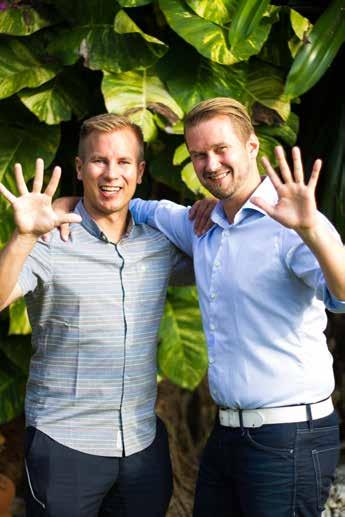
Tuomas Kauppinen and Harri Suominen, founders of Asia Exchange and Edunation.
network of partner universities and universities of applied sciences in Finland, as well as in Europe (currently Estonia, France and Ireland).
“In Asia exchange students is often only for one semester or so. But via Edunation students come from Asian countries to Finland etc. wanting to do the whole degree and might stay for four years. But this happens without anybody asking for a similar number of Finnish students having to go somewhere. It’s more an independent decision that they really want to come – and even stay after the degree in Finland, looking for work and even permanent residency!”
Edunation, that offers a wide range of easy and accessible courses, from Pathway Diploma to full degree programs, was born when the Finnish start-up guru Peter Vesterbacka contacted the Asia Exchange founders in the year they celebrated ten. Tuomas had also been asked frequently how one can study in Finland, where it used to be very cumbersome to apply.
“Peter suggested sending Asian nationalities to Finland and we got going and set up Edunation with him as one of the founders and owners. Peter has also been a good mentor and source of inspiration since then, with Asia Exchange benefitting a lot,” says Tuomas.
Edunation’s focus has been to make the application procedures easier and more efficient for both students and universities.
“At the same time, Finland introduced tuition fees for non-European nationalities and because of that we were able to start invoicing tuition fees for Asian students, and actually free is not always the best in this part of the world. In Hong Kong, for instance, they spend more money per capita on education than anywhere else in the world. So if it’s free they don’t think the education can be good. In Sweden the made this shift earlier and it has been very successful. Finland was a lot behind and needed to make the admission process much more customer-friendly. Edunation has been able to contribute and change all that. We can now accept students within one week to Finland, on behalf of partner universities that give the final confirmation. But in some cases even within two weeks the student can have the final offer letter for the degree studies. It was also a good thing for us as a private company to be able to operate financially by charging commission from the students.”
Edunation also supports Finland’s big need for additional talent going forward. It aims to create an international talent pool while making education the biggest industry in Finland. “Due to its aging population and a huge labour shortage in specific sectors such as IT I think Finland has and will face huge challenges in the future if the country is not able to get more young people or talented international university students who can even stay there after graduation and work for our companies or establish their own start-ups or so,” believes Tuomas.
Edunation offers applicants high quality customer service throughout the application process and also supports the students with their residence permit applications and with all the practicalities that come up when moving to a new country.
Edunation is constantly promoting the world-renowned Finnish education, striving to make it the biggest export industry in Finland. Its government has shown gratitude by awarding the two Finnish education start-ups grants multiple times, including support since the arrival of Covid-19, which has significantly hindered student flows across borders. “Especially early on, it would have been very difficult to go overseas and become international without those grants, and there are multiple programmes in Finland that helps companies to become more international.”
Covid-19 will also soon be seen as merely a mishap in history, and international students will once again be allowed in to most destinations by the start of 2021.
“And all of our partner universities offered the possibility to study online since September. In case of any delays due to immigration- and travel restrictions students could therefore study online as long as they could travel to Finland and continue the degree there later.”
“In 2021 I‘m optimistic that student mobility–being one of the megatrends as well–will keep on growing, so long term we have some great possibilities,” ends the Edunation President and CEO.
How to
Avoid Being Victim of Cybercrime

Did you know that in January of 2019, more than 1.76 billion personal information records of individuals were leaked and released in multiple breaches and hacking attempts made around the world? With the rise of online hacking, identity theft, and data breaches, it is no wonder that so many today have genuine concerns about their privacy and safety wherever they are online.
Whether you are a citizen or a tourist, there are a few steps you can take to minimize and eliminate your risk of becoming a victim of cybercrime. Using a few tips, learn how to avoid being a victim of cybercrime in Singapore while significantly increasing the amount of security and protection you have while using the internet.
With a better understanding of how to browse the internet safely and securely along with the a good VPN, maximize your protection without disruptions and/or distractions to take away from your online experience.
Nearly half of all cyberattacks are deemed malicious and with negative intent, which is why so many millions of internet users experience hacking and identity theft each year. While it is not always possible to avoid a hacking attempt or an identity theft attack, there are a few ways you can help to minimize your risk of becoming the target of a hacker, data thief, or identity theft: • Never connect to and use free wireless internet connections, even if you do not intend to check your bank account or log in to any specific website using personal credentials, email addresses, or passwords that are personal to you. If you must use a free wireless internet connection, be sure to do so as quickly as possible and only with anonymous websites. • Only use wireless internet connections that are trustworthy and reliable. Research various hotspots and local connections with the use of a public computer if possible to determine which access points are the safest and less likely to become a target of a hacker or an online theft. • If you are visiting Asia as a tourist or guest, avoid wearing flashy jewelry and bright colors, as this can signal to thieves and hackers that you are a tourist or that you are a viable target, depending on the area that you are staying in. Even if you are offline and just visiting the country, it is still possible to become a target of an online hacker or thief if you stand out in public. • Whenever you are traveling abroad and internationally, use email addresses and other information that will not link back to your personal information or accounts in your home country.
Tips on How to Avoid Being a Victim of Cybercrime
Avoiding becoming the victim of cybercrime is not always easy, nor is it always possible. However, using these tips while access the internet or browsing the web can significantly minimize your risk of becoming a target while stopping hackers and online thieves in their tracks: • Only connect to secure web connections and connections that have been verified or provided to you by your hotel or accommodations. If necessary, use professional connections, but keep in mind that your identity and IP address are not secured or protected whenever you are online. • Do not use free or public internet connections, regardless of your IT knowledge or your ability to protect yourself at home. • Do not give out personal information to strangers and those you meet on the streets, even if you believe them to be trustworthy.
• Do not share your hotspot connections or your wireless internet connection with anyone, as they may also be an online thief or hacker. • Do not visit locations that are known for high crime or cyberattacks. • Avoid entering personal and sensitive information such as email addresses, addresses, names, phone numbers, and passwords when connected to a public or free wireless internet network.
Using a VPN
One of the best ways to add a layer of protection to yourself whenever you are online and browsing the internet in Asia without putting yourself at risk of becoming a target or a victim of cybercrime is to invest in a VPN. A VPN, or Virtual Private Network, is a tool used by millions of individuals across the world to access and browse the internet safely, securely, and completely anonymously. You can download here - https://surfshark.com/download - to start using premium VPN service.
Using a VPN is often considered one of the best ways to mask and protect your identity online, which is especially important if you are traveling to Singapore on business or visiting on vacation as a tourist, as tourists and visitors are most likely to become a target of a local hacker or online thief in Singapore itself.
Advantages of Using a VPN
Using a VPN is not only easy and completely secure, but it is also one of the most accessible tools that are also affordable for anyone, regardless of your household’s budget. Most VPN services cost as little as just a couple of dollars each month to $10 per month, depending on the type of VPN you require as well as specific features you are looking for with the VPN you choose for yourself. Some of the most notable advantages and benefits of using a VPN for personal and business purposes include: • Increased safety while browsing: Having a working VPN in place while you are browsing the internet is a way to enjoy increased safety and security. VPNs provide complete and total anonymity for users, which allows you to access any website, stream any content, or download any file without putting your personal IP address, name, and the location at risk for exposure or vulnerability. • Anonymity: Are you tired of being tracked and monitored by website owners, tech corporations, and even your ISP or local and national government whenever you are online? With the use of a VPN, eliminate the risk of sharing your personal information as well as your browsing history with anyone, including your own internet service provider as well as any government agency. • Remove Geo-Targeted Restrictions: One of the biggest appeals of using a VPN anywhere in the world is the ability to bypass certain geo-targeted blocks, limitations, and restrictions that have been set in place. If you are attempting to watch a Canadian or American show, you may find it difficult to stream the media in some locations, depending on where you are as well as rules and laws in your area. Once you have an active VPN, you can quickly, easily, and securely remove all geo-targeted restrictions and blocks from anywhere in the world.
Unlocking geo-restricted websites, media, and content provides you with virtually unlimited access to the internet from any location. • Minimize Risk: If you are looking for ways to minimize your own risk of becoming a target of a hacker or cybercrime theft, consider using a VPN in Singapore, even if you are a full-time resident or citizen yourself.
One of the best ways you can protect yourself online in any country around the world is to use a trusted and reliable VPN solution. With a VPN in place any time you are online, avoid sharing potentially revealing, personal, or sensitive information with nefarious individuals and those who are looking for easy targets that they can steal from or scam.
Finding the Right VPN
Finding a VPN for you should first begin by determining your budget as well as the features you are most interested in using a VPN for yourself. Research and compare VPN providers that you are thinking of using to discover which solution is optimal for your browsing and streaming needs. It is also important to avoid using free VPN services, as they are not often as reliable and do not provide uptime guarantees for their customers and clients. When searching for a VPN, consider the following factors before finalizing your decision and implementing a VPN on your own computer or preferred electronic device. • Pricing: Premium VPN services typically cost just a few dollars a month, ranging from $.99 a month to more than $10/mo, depending on the service, its location, and the features and/or uptime guarantee they provide. • Location: Finding a VPN service that is available in Singapore is essential if you are living in Singapore or if you are simply just visiting. If your preferred VPN does not provide IP addresses or support for your current location, you will likely need to seek an alternative. • Features: Are you interested in a VPN so you can unlock streaming content internationally, or are you looking for high-speed private and secure connections for business purposes in Singapore. Before selecting the
VPN that is most suitable for you, be sure to compare features and functions of the VPNs you are considering to find your best option.
Cybercrime is not victimless, and impacts millions of individuals and households each year, costing billions in some countries and regions around the globe. Taking precautions and careful measures to protect yourself online at all times is a must. With the right security measures and a premium VPN solution that is accessible and affordable, maintain your peace of mind whenever you are online.




